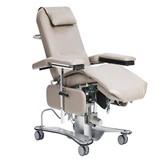What is the spinal cord?
The adult spinal cord is about 50 centimeters long and extends from the base of the brain to about the waist. It is the major bundle of nerves that carry messages between the brain and the rest of the body. The spinal cord lies within vertebrae. These rings of bones are together called the spinal column or backbone.
What is SCI?
Spinal cord injury is damage to the spinal cord that results in a loss of function such as mobility or feeling.
- Quadriplegia is loss of function below the neck
- Paraplegia is loss of function below the chest
The spinal cord does not have to be severed in order for a loss of functioning to occur. In fact, in most people with spinal cord injury, the spinal cord is intact, but the damage due to compression or bruising to it results in loss of functioning.
Can the function be restored after an SCI injury?
At the time of an injury, the spinal cord swells. As this swelling reduces, some functions may return. This can take up to 18 months after the injury. However, only a very small fraction of people with a spinal cord injury recover all functions.
A few SCI statistics

- Traumatic injury-causing SCI – transport accident 46%, falls 28%
- Non-traumatic causes of SCI are diseases accounting for 20%
- Male patients still outnumber the female patients (84% vs 16%)
- SCI was most frequent in the 15-24 year group accounting for 30%
Some symptoms of a spinal cord injury include:
- problems walking
- loss of control of the bladder or bowels
- inability to move the arms or legs
- feelings of spreading numbness or tingling in the extremities
- unconsciousness
- headache
- pain, pressure, stiffness in the back or neck area
- signs of shock
- unnatural positioning of the head
What to do if you suspect SCI?
In the case of an unconscious casualty, falls, motorbike, and car accidents it is safest to assume the potential for SCI.
- Call 000 immediately
- Don’t move the person or disturb them in any way unless it’s absolutely necessary. This includes repositioning the person’s head (unless the airway is blocked)
- Do NOT remove a motorbike riders helmet
- If conscious support head, neck, and spine in a neutral position at all times to prevent twisting or bending movements
- Encourage the person to stay as still as possible, even if they feel they’re capable of getting up and walking on their own.
- If the person isn’t breathing, perform CPR.
First Aid Training
If you are not prepared to perform first aid in case of an emergency, please book a refresher course today. First aid is all about remembering your DRSABCD, being confident and competent. You will then be in a position to minimize injury and potentially save a life.












-160x160-state_article-rel-cat.png)
























